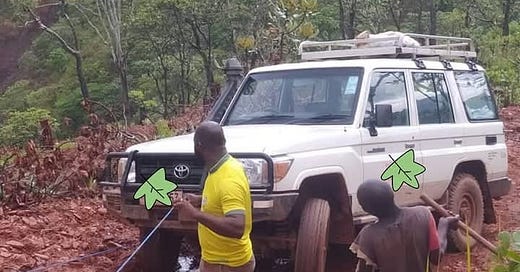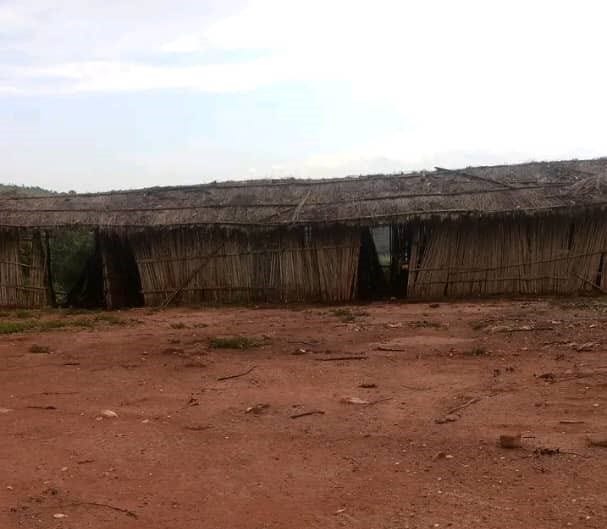Hidden Gold, Cave Dwellers, and the Paradox of Poverty in Rural Malawi: A Social Worker's Eye-Opening Journey
“Upon arrival, I was struck by the eerie silence pervading the market—unlike any other I had experienced—where people engaged in their trades without much interaction.”
MZIMBA, Malawi—A social worker's baseline evaluation in a remote northern Malawi region has uncovered a clandestine gold mining operation that starkly illustrates economic disparities, exploitation, and isolation in rural communities, writes Winston Mwale.
The social worker's account offers a glimpse into the lives of those residing in this secluded area.
“The women in this community face a daunting challenge. They hike for eight hours in groups to reach the M5 road, where they purchase fish to sell, only to return with their catch, enduring another eight-hour journey home,” she says.
This journey, described as a "death trap", highlights the risks they endure to make a living.
The social worker, Chisomo Seleman Banda, notes that the junior primary school in the area has only two teachers catering to 300 learners in grades 1 to 4, with a "chisakasa" (a makeshift structure) serving as their classroom block.
Essential infrastructure such as health centres, boreholes, and conventional water sources are absent from the community.
Network connectivity presents another significant obstacle, requiring careful navigation to locate functional communication spots.
“To reach my survey respondents, I had to drop off and walk for an hour and a half, as our vehicle—a Toyota Land Cruiser—could not navigate the terrain,” she says.
Located 83 kilometres off the M1 road in an area straddling Mzimba and Nkhata Bay districts, the hidden mining camp operates under a veil of secrecy, revealing a complex landscape of economic opportunity and systemic marginalization.
The region, home to Tonga, Chewa, and Tumbuka people, presents a stunning yet challenging environment of mountains and dense forests.
However, the natural beauty masks profound socioeconomic challenges that define residents' daily experiences.
The social worker recounts relying on the government extension worker, who acted as a guide, to navigate the limited spots with network access.
"What made me stay up and sleepless during the night is the striking difference between the campers I found up the mountain and the natives around my duty station. The natives, who are my survey respondents this week are any description of poverty, real poverty, low literacy levels, exclusion and incomprehensible marginalisation," the social worker says.
This observation underscores the stark disparity that lies at the heart of this story - a community rich in resources yet languishing in poverty.
A Shrouded Gold Rush: Silence, Suspicion, and Exploitation
The discovery of a hidden gold mining camp deep in the mountains adds a layer of complexity to the narrative.
“Venturing into the hidden camp piqued my curiosity. Access is tightly controlled; we had to identify ourselves and our intentions before being granted entry. The camp, a three-hour hike up the mountain from my duty post, is a hub for gold miners, buyers, and sellers,” she notes.
“Upon arrival, I was struck by the eerie silence pervading the market—unlike any other I had experienced—where people engaged in their trades without much interaction.”
This physical isolation mirrors the veil of secrecy surrounding the camp's operations. Entry is strictly controlled, requiring individuals to disclose their identities and intentions before being granted access.
Chisomo, accompanied by a government extension worker, had to undergo this vetting process and receive clearance from the camp leaders.
The atmosphere within the camp is described as "creepy and hideous" - a stark contrast to the vibrancy of typical markets.
Silence is the norm, and the diverse mix of inhabitants, including Tanzanians, Mozambicans, Jamaicans, and Malawians from Blantyre and Lilongwe, operate with an unspoken understanding.
The social worker notes that the Jamaicans present are engaged in a separate, unspecified trade, adding another dimension to the camp’s clandestine activities.
The tight control within the camp manifests in several ways:
Restricted Entry: Only two designated motorbikes are permitted to ferry individuals to and from the base of the mountain, and a road has been deliberately cut off to restrict access.
Communication Blackout: Mobile phones are prohibited, and all devices must be surrendered to the leader upon entry.
Culture of Silence and Mistrust: New faces are met with suspicion, and excessive questioning is discouraged. The extension worker warned the social worker against probing too deeply into the camp's affairs.
“Osakafunsa zambiri kumeneko alangizi, nkanakonda kuti tisapite, koma poti mwafunitsitsa, tiyeni koma osakafunsa zambiri, phone isiyeni pa silent komanso osamakayigwira," the extension worker cautioned, which translates to: "Don’t ask too many questions social worker. I wouldn’t have wanted us to go, but since you insisted, let’s go but don’t ask too many questions, leave your phone on silent and don’t even think about touching it".
Chisomo was particularly struck by the contrast between the "well-polished gentlemen" of the camp, who appeared to be profiting handsomely from the gold trade, and the impoverished locals who were relegated to performing menial tasks and engaging in sex work.
The locals, despite living on land rich in gold, were trapped in a cycle of poverty, receiving a fraction of the wealth being extracted from their ancestral land.
The contrast between the campers and the local inhabitants was stark. While the campers appeared financially stable and educated, the locals faced dire poverty, low literacy levels, and systemic marginalization.
“The natives, who have lived in this area for generations, find themselves exploited by the miners who profit from the gold beneath their ancestral land. Many locals resort to "ganyu wa magweji"—casual labour—and provide sex services to the campers, further highlighting their economic desperation,”she says.
A camper from Lilongwe, mistaking the social worker for someone he knew, inadvertently revealed the profitability of the gold trade.
He claimed to earn around K4 million per month, buying gold for K500,000 and selling it in urban areas, casually mentioning navigating police checkpoints along the way.
"Kubweretsa 500 grand kunoko ndimaweluka nka 4 mita tikakatula katunduyu mtauni Kwa mabwana. Mbola ndi apolisi kumseuko koma ukadutsa, nzabhobho. Pena timakhala kuno 2 months, katundu akakwana size yabho basi timakasiya kaye nkubweranso", he shared, meaning: “Bringing K500,000 here I return with K4 million when I take this product to town to the bosses. There are also police along the way but once you get past them, it’s smooth sailing. Sometimes we stay here for 2 months, once the product reaches the size of the boot, we leave it and come back again".
The lack of infrastructure in the area, despite the presence of such a lucrative resource, further emphasizes this disparity.
The social worker reflects on the possibility of a more structured mining operation, perhaps run by a legitimate company, that could potentially benefit the local community through the development of essential infrastructure.
"If only this mining was structured, I'm sure if some company were to do it, it could have trickled down to the benefit of the locals, at least a primary school and a health centre," Chisomo notes.
Seeking Sanctuary: The Enigma of the Cave Dwellers
The presence of educated religious extremists living in caves adds another layer of intrigue to the narrative.
These individuals, including doctors and other professionals, chose to flee urban areas during the COVID-19 pandemic, seeking refuge from what they perceived as the contaminating influences of modernity.
They reject formal education for their children and abstain from eating meat, adhering to their strict religious beliefs.
The social worker offers limited information about this community, describing them as "another excluded sub-community" and promising to elaborate on their story in future writings.
“Next, I plan to explore the second intriguing community—the cave village inhabited by educated religious extremists who have abandoned modern civilization for a simpler life,” she says.
Their presence, however, raises questions about the motivations behind their retreat from society and the challenges they face in their chosen lifestyle.
A Call for Change: Bridging the Gap Between Resources and Reality
The social worker's account raises critical questions about resource management, social justice, and the impact of external economic forces on vulnerable populations.
The absence of basic infrastructure in a resource-rich area dramatically illustrates the disconnect between wealth extraction and community development.
Local infrastructure remains critically inadequate. Despite sitting on potentially lucrative gold deposits, the community lacks essential services like schools and healthcare facilities.
Chisomo suggests that a more regulated, structured mining operation could potentially generate resources for community development.
The journey reveals a microcosm of broader challenges facing rural Malawian communities: geographical isolation, economic exploitation, limited access to services, and complex cultural dynamics.
As the investigation continues, fundamental questions remain about regulatory oversight, resource distribution, and strategies to transform economic opportunities into community benefits.
The social worker's account transcends a mere travelogue, emerging as a powerful call to action.
It demands a deeper understanding of marginalized communities' challenges and a commitment to creating more equitable economic and social structures.
In the heart of Malawi's remote mountains, this narrative exposes the intricate layers of poverty, resilience, and potential that define rural existence – a story of contrast, challenge, and the persistent hope for transformative change.
“As I reflected on the week, I couldn't help but wonder how news of this hidden camp spread, attracting people from all over the world despite its remoteness. What prompted them to seek out this isolated place for business?” Chisomo quizzes.





